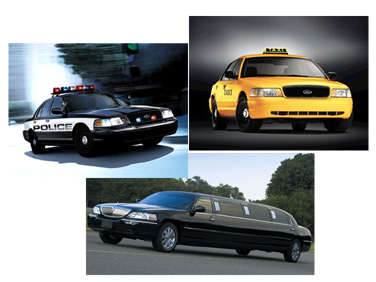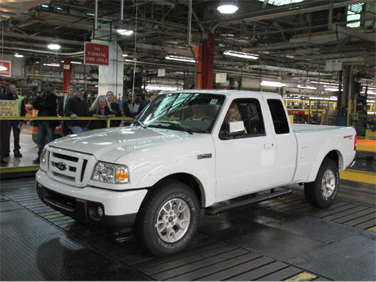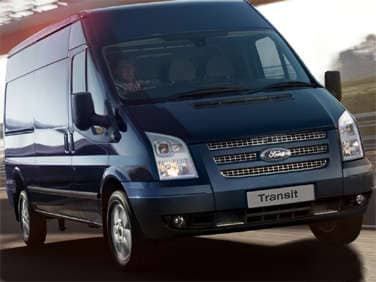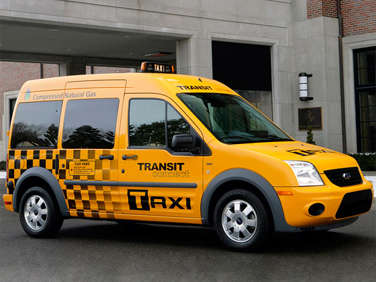Recent Articles
Popular Makes
Body Types
Ford Fleet Vehicle Line-Up Getting Major Overhaul

To say Ford Motor Company is a major player in the fleet market is a gross understatement. For this reason, looking at the big changes being planned for Ford's fleet vehicles over the next several years makes the timing of this overhaul very surprising. One of the reasons fleet vehicles go so long without major changes is that it makes it easier for customers to buy new models and use existing equipment such as light bars, ladder racks, etc., but by 2013, five of Ford's top-selling and most iconic fleet vehicles are set to be replaced by more modern, more practical and, in all likelihood, more fuel-efficient vehicles. Here's a look at which models are on their way out and which replacement vehicles you'll soon see taking over duties such as police cars, delivery vans and limousines.
Ford Ranger
After serving as Ford's compact pickup truck since 1983, the final Ford Ranger rolled off the assembly line this month. While most of its competitors have grown in size creating a mid-size truck market, the Ranger has stayed true to its original compact design allowing for a lower starting price and better fuel economy. Ford's ultimate reason for dropping the Ranger was the fact that sales have been on a steep and steady decline over the last decade with only 64,114 sold so far through 2011 compared to around 300,000 in 2001. Ironically, this year could very well be the Ranger's best sales year since 2006. Another downside to all of this is that Ford's Twin Cities Assembly Plant (where the Ranger is built) will also suffer the same demise as the compact pickup. This picture shows the final Ford Ranger ever produced in North America, and it is heading to work as a fleet truck for Orkin Pest Control.

... being replaced by Ford Transit Connect panel van
The Ford Ranger name will carry on globally on a pickup sized just smaller than the current F-150, but in the U.S., companies looking for a compact cargo vehicle from Ford will now have to check out the Ford Transit Connect panel van. The Transit Connect offers the same fuel economy as the Ranger with EPA estimates of 22 miles per gallon in the city and 27 mpg on the highway, but if delivers more cargo abilities with its fully enclosed, tall roof design. One area that the Transit Connect can't keep up with the Ranger is the fact that its starting MSRP of $22,035 is almost $4,000 more than the base price of the Ranger. Of course, there are still plenty of compact/mid-size pickup trucks on the market such as the Chevrolet Colorado, Toyota Tacoma and Nissan Frontier, but the Ford F-150 offers fuel economy and starting prices that rival most smaller trucks as well as an EcoBoost engine option that can deliver towing abilities more than double mid-size trucks. Similar to the Ranger, the Transit Connect is now being offered with an all-electric powertrain called the Transit Connect Electric.
Ford Econoline/E-Series
When it comes to full-size vans, the Ford Econoline - later renamed the Ford E-Series - has been a staple in the industry since the 1970s. This versatile van is available as a passenger van, a cargo van or a cutaway cab and chassis truck used for everything from church and delivery vans up to box trucks and ambulances, but Ford announced that it will end production of the E-Series in 2013. The Econoline name was first used on a van in 1961, and it became a full-size van capable of tackling just about any job in 1975. Since its increase in size, the Econoline has seen very few changes including its only major redesign in 1992 and it was renamed E-Series in 2001 to fit the naming system used on the F-Series pickup trucks.
... being replaced by Ford Transit
Taking the place of the E-Series in Ford's line-up will be a global truck called the Ford Transit. Not to be confused with the compact Transit Connect, the full-size Transit will be offered in an equally diverse range of configurations to meet the needs of fleet companies and business owners alike. When it goes into production in 2013, the North American version of the Ford Transit will be built at Ford's Kansas City Assembly plant, and, like the F-Series and E-Series models, it will be offered in a range of models from T-250 up to T-550. Unlike the compact pickup segment that will end with the Ranger, the full-size van segment offers plenty of rival vehicles for the Ford Transit including the Chevrolet Express, GMC Savana, the Euro-styled Mercedes-Benz Sprinter and the all-new, truck-based Nissan NV line-up.

Lincoln Town Car
The Lincoln Town Car has been an important vehicle for transporting people - both dead and alive - over the years, but the full-size, body-on-frame sedan ended production earlier this year after 30 years of service. Used for everything from limousines to hearses, the rugged design and luxurious interior of the Town Car has made it a popular vehicle since it was first introduced in 1981. Even in regular retail form, the Town Car was known for its plush interiors and smooth, comfortable ride making it popular highway cruiser. The Lincoln Town Car shared its Panther platform with the Ford Crown Victoria and the Mercury Grand Marquis.
... being replaced by Lincoln MKT Town Car
Some livery companies have already switched to using Lincoln Navigators to transport passengers, but the Lincoln MKT Town Car will soon be available as a direct replacement for the Town Car sedan. Like the Town Car, the new MKT Town Car will feature a redesigned interior focused on seating five occupants luxuriously rather than the standard MKT's seven-passenger seating configuration. Likewise, Lincoln is also planning to introduce factory-built versions of the MKT in hearse and limousine body styles with the latter featuring a 10-foot stretch in wheelbase. While Lincoln is hoping that the adding space of a crossover will suffice for such duties, the Town Car's main rival, Cadillac's full-size sedan, is completely redesigned for 2013 and is being named the Cadillac XTS. So far, Cadillac has not announced plans for livery versions of the XTS.
Ford Crown Victoria
The Ford Crown Victoria has been giving rides and patrolling the streets in the U.S. since the late 1970s, but its reign as top taxi and police car will come to an end in the very near future. Production of the Crown Victoria already ended earlier this year, but it has had a relative stranglehold on the police vehicle market since the Chevrolet Caprice ended production in 1996. The Crown Vic (also called the LTD and LTD Crown Victoria over the years) was a popular choice for police departments because it utilized the same body-on-frame Panther platform as the Lincoln Town Car and Mercury Grand Marquis. Similar to other Ford fleet-minded vehicles, the Crown Victoria has changed very little over the years receiving only two major redesigns since utilizing the Panther platform in 1979.
Police Interceptor being replaced by Ford Taurus
Although it would be hard to think of a better car that could fill the police-car role than the Crown Victoria, the Ford Police Interceptor Sedan, based on the 2013 Ford Taurus, goes on duty next year. What the Taurus lacks in body-on-frame construction and V-8 power, it makes up for with impressive safety and fuel economy. Surprisingly, the Taurus also features about the same interior space as a Crown Victoria with 102.2 cubic inches of passenger volume (versus 106.4), and the Taurus is even closer when it comes to cargo space with 20.1 cubic feet of space in the trunk (Crown Vic offers 20.6). Also new to the police car market, the Ford Police Interceptor Sedan will be competing against the new Chevrolet Caprice and the Dodge Charger. Unlike the Crown Vic and the upcoming police rivals, both the Taurus- and Explorer-based Interceptor models will be made in the U.S.A. at Ford's Chicago Assembly Plant.
Crown Victoria taxi being replaced by Transit Connect Taxi
When it comes to taxicabs in the U.S., the Ford Crown Victoria is probably outranked only by the classic Checker Taxi in terms of popularity and icon status. Instead of looking for a yellow sedan to hail for a ride, Ford will switch its primary taxi fleet vehicle to the new Ford Transit Connect Taxi. The Transit Connect Taxi benefits from a smaller footprint making it easier to maneuver in dense, urban areas, but its tall roof also helps to improve passenger comfort. In terms of fuel economy, the Crown Vic's 17 mpg city/25 mpg highway will be replaced by the Transit Connect Taxi's 22 mpg city/27 mpg highway ; of course there's always the Transit Connect Electric which is expected to have an all-electric driving range of 80 miles. Other rivals to the Transit Connect Taxi include the Nissan NV200 (which has already been named New York City's "Taxi of Tomorrow") as well as fuel-efficient, passenger-friendly cars like the Toyota Prius.
